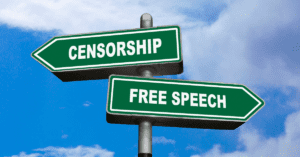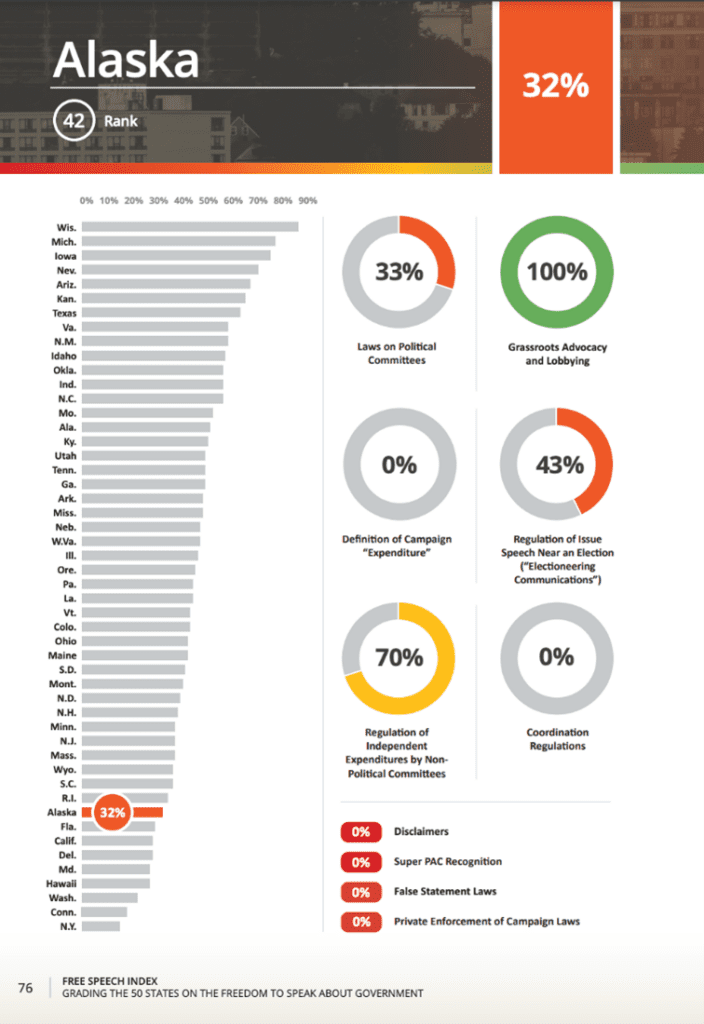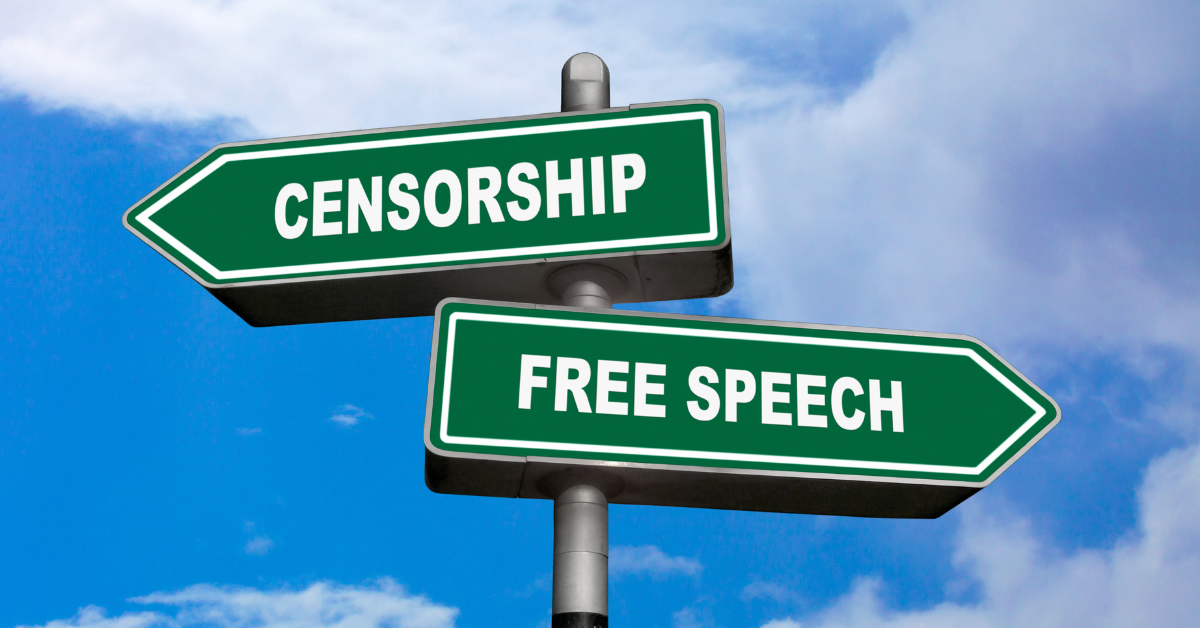By Josiah Davidson
 The Constitution’s First Amendment — a keystone of a democratic society — is under fire in Alaska. According to the 2022 Free Speech Index compiled by the Institute for Free Speech, Alaska’s free speech laws are some of the worst in the nation. Alaska ranks 42nd nationwide, which is no small feat considering that only four states scored 70% or higher.
The Constitution’s First Amendment — a keystone of a democratic society — is under fire in Alaska. According to the 2022 Free Speech Index compiled by the Institute for Free Speech, Alaska’s free speech laws are some of the worst in the nation. Alaska ranks 42nd nationwide, which is no small feat considering that only four states scored 70% or higher.
The intention of the Free Speech Index, according to IFS’ chairman, is to show where states may improve to help foster a freer America and give citizens the ability to “support unpopular or disfavored causes without fear of government retribution.” The index examines free speech surrounding elections, candidates, policies, and government. It uses a 10-category ranking system including laws on political committees, grassroots advocacy and lobbying, and regulation of issue speech near an election, among others. All ten categories are listed in Table 1 along with Alaska’s ranking and score.
A state can achieve a maximum score of 1,000 points if its laws impose minimal speech burdens on its residents. Alaska scored only 320, or 32%, and earned no points in six out of ten categories.
| Table 1: Alaska’s Ranking and Score, 2022 Free Speech Index | ||
| Category | Alaska’s Rank | Alaska’s Score |
| Laws on Political Committees | 30th (11-way tie) | 33% |
| Grassroots Advocacy and Lobbying | 1st (16-way tie) | 100% |
| Definition of Campaign “Expenditure” | 50th (40-way tie) | 0% |
| Regulation of Issue Speech Near an Election | 38th | 43% |
| Regulation of Independent Expenditures by Non-Political Committees | 15th (11-way tie) | 70% |
| Coordination Regulations | 50th (28-way tie) | 0% |
| Disclaimers | 50th (10-way tie) | 0% |
| Super PAC Recognition | 50th (22-way tie) | 0% |
| False Statement Laws | 50th (19-way tie) | 0% |
| Private Enforcement of Campaign Laws | 50th (8-way tie) | 0% |
Even the highest-scoring states of Wisconsin, Michigan, and Iowa, which scored above 70%, have areas that need improvement. These states need to reduce the burden of disclaimers and clarify their political committee laws, which are integral parts of election speech. Additionally, most states impose spending thresholds where “informational interests” are “outweighed by the substantial and serious burdens.” Ultimately, the Index reveals that the U.S. is experiencing a “nationwide failure from a First Amendment perspective.”
Most states failed to score well, but Alaska’s free speech laws are especially burdensome. As can be seen in Figure 1, Alaska scored poorly in every category except in the regulation of independent expenditures by nonpolitical committees (70%), and grassroots advocacy and lobbying (100%).
Figure 1: Alaska’s state ranking.

Regarding Alaska’s laws on political committees, the index noted that the state has an unclear definition of the activities that would determine the classification of a political committee. Additionally, the spending amount that triggers this classification is $100.01 in Alaska, whereas the index recommends a threshold of $2,500. Additionally, groups are forced to report the employers of donors, which creates misperceptions of the source of a candidate’s support.
Under the category of regulation of issue speech near an election, otherwise known as electioneering, Alaska’s state government is far harsher than most states, sitting at 38th place with a 43% score. The state’s regulation of speech reaches beyond TV and radio and encompasses “virtually any type of communication.” It does not exempt charities or media outlets, as the index recommends, and regulates mentions of a candidate even outside of the district they are running in. These requirements are triggered even when there is no spending. Governments are often biased, and Alaska’s strict regulation of issue speech makes it easier to crack down on speakers’ rights.
The index negatively singles out Alaska (and nine other states) for its heavy-handed approach to advertisement disclaimers. In Alaska, disclaimers must identify the donors of a political campaign within the advertisement. Making donor information public, and in such a prominent way, invites harassment and retribution. This burden wins Alaska a 0% score in the disclaimer category.
Alaska is given another demerit for allowing “private enforcement of campaign laws – enforcement of the law directly by one’s political opponents.” Alaska is one of eight states that allow anyone to seek to enforce campaign finance laws. It is not hard to see how this sort of law could be abused to chill speech one disagrees with by forcing speakers to endure costly litigation.
The index recommends that states examine their laws and determine if any are blatantly unconstitutional and violate the First Amendment. The index recommends that states raise severely low monetary thresholds for political committee registration and reporting. This is a step that Alaska should consider as the state’s monetary threshold is $100.01, which has been ruled unconstitutional before. The index notes that “thresholds under $1,000 have repeatedly been struck down by courts.”
Furthermore, the index recommends that the word ‘expenditure’ be defined more clearly as it relates to campaign expenditures. The index notes that the Supreme Court allowed limited regulations on campaign speech spending through Buckley v. Valeo, but only when it overtly “advocate[s] the election or defeat of a clearly identified candidate.” Alaska law defines campaign expenditures too broadly to meet this standard.
The Founders wrote the First Amendment knowing that a government that could regulate speech would be able to stifle dissent and arbitrate which perspectives are aired in the public square. Alaska’s free speech laws fail to recognize these dangers and give the state government inordinate power over campaigns and elections. Alaska needs to address its free speech laws because free and fair elections are fundamental to our democratic republic, and freedom of speech is the only means by which such an end is attained.
Josiah Davidson is Alaska Policy Forum’s Summer 2023 Policy Intern. He is currently a student at Hillsdale College and is from Palmer.
